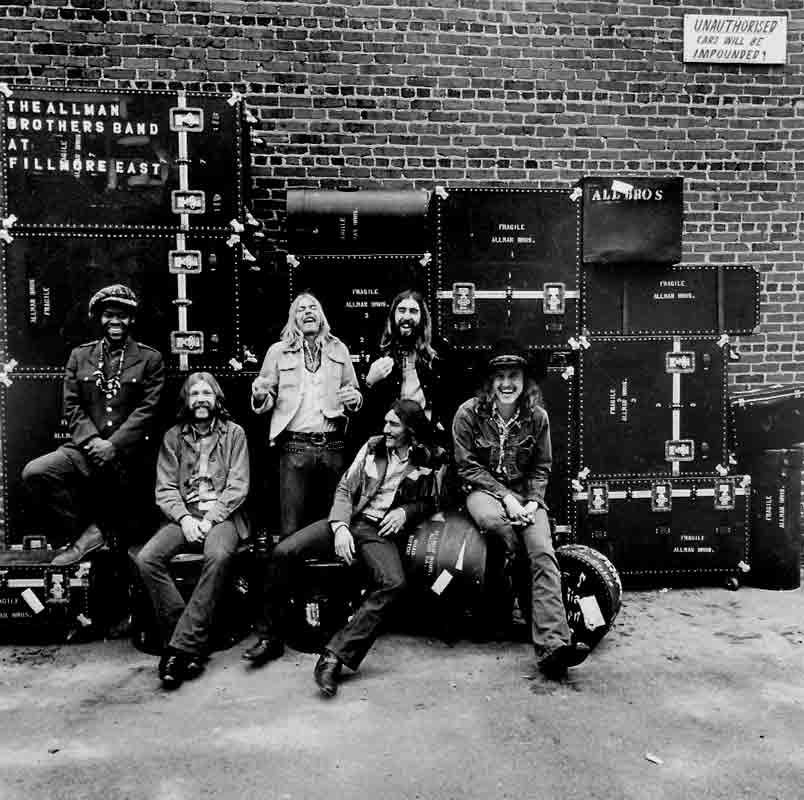While the Grateful Dead started in the Bay Area, where most ’60s and ’70s counterculture found its footing, another jam band with a little more southern charm, The Allman Brothers Band, began its story in Macon, Georgia. In 1965, brothers Duane and Gregg Allman needed a way to get Gregg out of the Vietnam War draft. The plan was that Duane would shoot Gregg in the foot to get a medical exemption. So after whiskey was drunk and a target was painted on a moccasin, a shot rang out, and The Allman Brothers Band was able to form.
The Allman Brothers Band (or The Allmans/The Brothers) consisted of Duane Allman on slide guitar, Dickey Betts on guitar, Gregg Allman on keyboards, Berry Oakley on bass, and Butch Trucks and John Lee “Jaimoe” Johnson on drums. The Brothers would release their first album in 1969. According to Alan Paul’s book “One Way Out: The Inside History of The Allman Brothers Band,” it was during the recording of this album that members exchanged music tastes, including jazz greats like John Coltrane and Miles Davis, as well as the Grateful Dead and The Rolling Stones. By this time, the Grateful Dead had already released three studio albums, and their first live album would be released within a week of The Allmans’ debut self-titled album.
A big change to the Allmans’ lineup came in 1971 when Duane Allman was riding his motorcycle in Macon, Georgia, speeding behind a boom truck that stopped unexpectedly. He hit the truck, was thrown off his motorcycle, and then the motorcycle landed on top of him. Despite receiving medical attention, he died from his injuries hours later. The band would continue without him for years (despite breaking up a few times) until their final show at the Beacon Theatre in New York City, New York, in 2014. However, the Allmans had an album in progress when Duane died, and it would be the last studio album to feature him. Eat a Peach would be released on February 12, 1972, and featured performances from the same shows used for their first live album At Fillmore East, in March 1971. If you pay close enough attention to the end of “Whipping Post,” the 22-minute track that closes out the album, you’ll notice that it is the same as the beginning of the 33-minute Donovan-inspired “Mountain Jam” on Eat a Peach.
The Allman Brothers Band shows that blues-ier end of the jam band spectrum, with covers of several blues tracks like “Statesboro Blues,” “Stormy Monday,” “Hoochie Coochie Man,” and more. The Allmans tend to have a little more structure to their jams, making them more listener-friendly than other jam bands. Even without contributions from Duane Allman after his death, the band still found success outside of the acclaim of At Fillmore East with albums like Eat a Peach and Brothers and Sisters. Gregg Allman and Dickey Betts were the main writers for the group, with Betts writing their biggest hit “Ramblin’ Man” as well as some of their most jammed-on songs, “Jessica” and “In Memory Of Elizabeth Reed.”
“Jessica” is a seven-and-a-half-minute instrumental track on Brothers and Sisters that would sometimes get stretched out to 13 minutes or longer. I would highly recommend the performance from New Year’s Eve 1973, Daly City, CA. “In Memory Of Elizabeth Reed,” another instrumental that appeared on the band’s 1970 album Idlewild South, clocks in at six minutes and 54 seconds. It would be seen again very soon on At Fillmore East, but this time with an extra six minutes and 10 seconds, nearly doubling the song. However, this isn’t nearly the most that they did with the song. On a 1974 solo tour, Betts would make a stop at the Winterland Ballroom on Dec. 14 and would grace the crowd with a whopping 41-minute version of “In Memory Of Elizabeth Reed” like no other that had been played or will ever be played. It is truly and wholly one of the prime examples of what a jam is, with an alto saxophone, violin, and pedal steel (along with the traditional bass and drums of a band) accompanying Betts. The instruments, as mentioned earlier, each get their solos in the piece, allowing predecessors of the jam genre to shine with jazz and bluegrass-fueled segments throughout the song.
The Allmans display how much they deserve a space of recognition amongst jam bands with their songs like, “Whipping Post,” “Mountain Jam,” “In Memory Of Elizabeth Reed,” “Dreams,” and “Jessica,” which they demonstrate their improvisational skill on, they helped lay the groundwork for the future of the jam band genre. If you’re interested in giving The Brothers a listen, I’ve linked a playlist I made of my favorite songs by them here.


